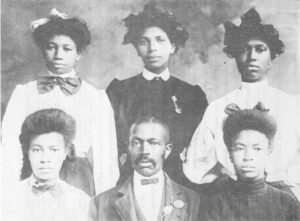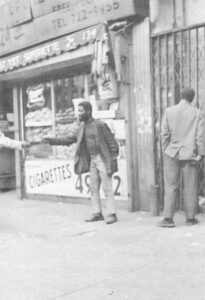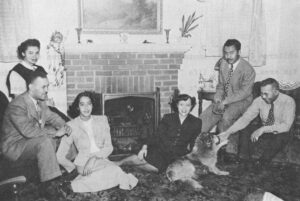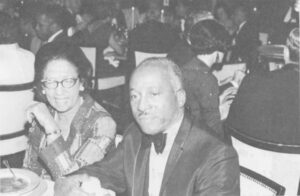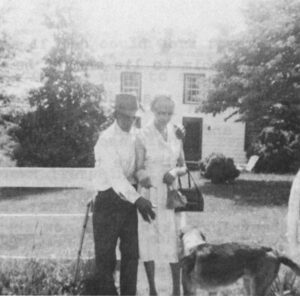Barrington Daniels Parker, Jr. strides through the Wall Street throng at 12:15. His eyes are shaded by prescription lenses but one can still see the small furrows that time has be-gun to place on his 29 year old face. His grey summer suit is well tailored and fits a body that has recently been subjected to early morning jogging around New York’s Central Park and tennis at a friend’s court in East Hampton. His button down shirt and his red striped tie are from Brooks Brothers, and in his right hand he carries a brown briefcase that has seen more than its share of wear. As he moves along Wall Street In the summer sung his face is slightly upturned to speak to a taller friend, his voice is measured, his wit is sparkling and one begins to feel that though he might stumble he would never fall.
And it is good to speak to this self-assured# six foot two inch young man as he makes his way to Oscar’s at Beaver and William Streets to have lunch with his client, a man In his fifties, an Investment banker and a charter member of the WASP sect that not so discreetly wields its power along the Eastern seaboard.
For B. D. Parker, Jr. is the grandson of Rosa Jones Holloman (See first newsletter) and the great-grandson of Robert Shelton Jones who 125 years ago, was born a slave in Albemarle County, Virginia, and who on his death-bed told his daughters: “I want you to move on up, I want you to be somebody.” Given this country’s enormous racial antagonism and the seeming Intransigency of a system of segregation that really only began to break up with the Civil Rights Act a decade ago, an undiscerning eye may wonder at the ease of Parker’s manner in this bastion of privilege. For he does not question his position in a Wall Street firm of impeccable reputations “I can’t begin to tell you how much I have learned over the past three years,” he says. “There was a reservoir of knowledge here, and I was fortunate enough to be able to drink great gulps at a time.” And so he calmly flies all over the country on his firm’s business knowing that his clients may be surprised to see that the man they have been talking to, the man whose advice they have been readily accepting is black. I press him as we walk in the summer sun, for I am sure that there must have been awkward moments when, on his peregrinations around the country, he ran Into the client who accepted his written legal advice without difficulty, and then, face to face, momentarily finds It disturbing to hear that well-modulated voice coming from that black face and telling him about the possibilities of gain or loss in his corporate millions.
Parker clucks his tongue and then searches his memory. After a while he says: “There has really been nothing that you can pin down. At the level on which I’m dealing, people are pretty sophisticated, and they have generally learned to conceal surprise. After all, they know that they have been talking to me for some time on the telephone, that they have been receiving my letters, and that I know what I’m talking about. When we finally meet, I’m still the adviser, I’m still the person from whom they expect to hear good news.”
I look at him as he pauses in front of Oscar’s, and I’m wondering if his confidence seems overstated, if his assurance masks some kind of vulnerability. For I know that in this country, black mobility is still limited, and black dreamers must often keep their dreams to themselves. But I know, too, that there have been very few unplanned moves in the life of Barrington Daniels Parker, Jr., and about all the care that has led him to this competency in a New York that rewards excellence. So if, before he is 30, he seems to have the measure of his life, if he stands at the resonant center of a black middle class of achievement, he is only following the chart that Robert Shelton Jones drew up over a century ago, when he walked – as a free man – from Tallahassee, Florida to Albemarle County in Virginia at the end of the Civil War. He had made his move. He had decided that the county in which he grew up before he was sold would be the place where he would “lay down his buckets.” And so, he married there, bought some land and began the tortured climb to pull his family out of poverty.
Barrington Parker was born August 21, 1944 In Washington, D.C., as the second son of Marjorie Holloman Parker (the granddaughter of Robert Shelton Jones) and Barrington Daniels Parker, a young lawyer who had been born In the District of Columbia, had attended the University of Chicago Law School, and had now returned to his birthplace to try to make a name for himself. Parker recalls a childhood of love and affection. With his older brother Jason (a 1964 graduate of Princeton and now working on a PhD in Chinese studies at his alma mater) he would spend a lot of time at the home of his maternal grandparents. His.grandfather, John L.S. Holloman, was a Baptist minister of such devotion and rectitude, that no one ever questioned his word and his moral authority. When he died on May 6, 1970, he had spent 53 years as pastor of one church – the Second Baptist Church in Washington. With his wife of 58 years, he formed a center around which his grandchildren moved; and if those grandchildren believed that they could take advantage of age, that they could surreptitiously spoil themselves, they were grossly mistaken. Parker remembers winter evenings in the living room of his grandparents’ home when, as a child, he would hear long-winded debates about the problems of the country and black peoples. His grandfather, he remembers, would sit as the moderator as people from around the country gathered in the large living room after dinner. “It was almost as if they ran a salon,” Parker recalls, “only of courset religious matters played a large part in the discussions, and the welfare of black people was always the number one subject to be discussed. I think I learned so much In that living roomp because Papa would call upon me out of the blue, and I had to have some opiniong I had to show that I had been listening. Ignorance was not to be tolerated, and no excuses were to be made because of one’s youth. Jason and I learned quite early that we were part of an ongoing lifestyle, that there was a rhythm to everything we did, and that we were expected to take our places one days in this scheme of things.” I wondered if this process didn’t seem too deliberate, if his youthful enthusiasms had not atrophied under the weight of adult supervision, and if formality had not replaced youthful spontaneity.
 | Barrington Daniels Parker at 18 months. |
Parker smiles and rubs his chin and says: “If you visit the home of my parents you will see that informality is the touchstone of whatever we do. You see, the training was all so subtle, so expertly handled, that while you were expected to take part in discussions, you were also expected to make mistakes and these mistakes were treated lovingly. The only inexcusable transgressions were rudeness and indifference.”
And a visitor to the Parker home sees that the tradition of good talks of argument, of repartee, of lightening wit is being carried on. Parents are called by their first names out of respect and love and camaraderie, and all opinions are to be challenged. One begins to understand, then, that the Parker who calmly suggests to his older client that be try the oysters Rockefeller and duck for lunch at Oscar’s, or who Insists that his chicken Kiev be just rights did not just spring up. He comes from a black tradition about which very little is known in this country: And that is, quite simply, a tradition of familial academic excellence and achievement; a strong feeling that one must learn as much as one can, about as many subjects as one can reasonably be expected to discourse upon. So even today, in spite of a busy legal schedule and active community work, Parker has taken up bird watching and has made his forays to Vermont and has begun to talk about the relative lengths of the bills of the thrush, the finch, the toucan and the spoonbill.
It Is interesting to note that before Parker got to college, all of his education was on a segregated basis. He attended McKinley Technical High School at Second and T streets In Northeast Washington, and at sixteen received his letter of acceptance from Yale University. McKinley was, at the time of Parker’s graduation, about 98% black. About 50% of its graduating class went on to college, and while this figure is not unimpressive, it should be noted that in the 1930’s and 40’s Dunbar High School – all black, and the alma mater of Parker’s parents – turned out an impressive number of blacks who went to Ivy League schools. (This phenomenon, since it touches upon the lives of the Parker/Holloman family will be examined in newsletter #4) What Dunbar High School and McKinley Technical High School had at their core was a committed group of young, black professional parents who were determined that white America would not confine and limit their children.
Parker graduated from Yale in 1965 as a history intensive major. He had been a member of Beta Theta Pi and St. Elmo’s, one of the eight aboveground Senior Societies that accept 15 men each year to membership and are rumored to have lasting effects on one’s personal and professional life. Parker, of course, was the only black in his society that year, and when I ask him about his relationship with the other members of his group, he is purposely vague. “Do you still see on a social basis your club members?” “Sometimes.” “Do you see them on a professional basis?” “Sometimes.”
He is not, however, reticent to talk about Yale. “I guess I always felt that I would go to an Ivy League school. My parents wanted it, and I came to believe that if one could get the best education in the country from attending one of those schools, then that was where I belonged. After Jason was accepted at Princeton, there was no question that I had to work damn hard to get into one of the big three. When I got to New Haven, I was surprised to find so few blacks. This was the pre-civil rights era, you remember, and there were only three other American blacks, a couple of Africans and a West Indian, I think. Seven black faces in a class of over one thousand. Now one can either think that one is so extraordinary as to merit acceptance by this school, or one can see a pattern of exclusivity, quotas and discrimination. You must remember that for the five or so years before 1961, Yale would accept less then ten blacks, five would go to other schools, and about five would go to New Haven.
It was a lonely time. But it is good to go there now, and see so many black faces, to match the self-assurance of so many brothers and sisters. I’m told that applications are way up now. Blacks no longer hesitate to apply, so that for the class of 1975, there were 536 applications, 144 admitted and 85 matriculated. The other 60 or so went to the schools they most wanted to get into; Yale was their second choice. For some reason, that makes me feel good. Although I know that I would want my son to go to Yale, I must say that the options that we have now to accept or reject an Ivy League education in favor of what is most suited to our individual needs, fill me with a kind of optimism about our possibilities.”
After Parker graduated from Yale# he spent the next year teaching American history at Phillips Exeter Academy in Exeter, New Hampshire. He umpired baseball, coached 9th grade club basketball, and let some cool air into the hothouse in which he had been operating for the past four years, “I’m a great believer in taking a year off between college and graduate school. One needs time, I think, to decompress, to drift, to think and finally to gather one’s emotional resources for the professional school push.”
Parker pushed on to Yale Law School, graduated in 1969, and is full of warm memories of those days, “For some reason law school was fun. I would be challenged intellectually every day, and would have to rise to the challenge. There were times when I found being an undergraduate at Yale a colossal bore, but I never seemed to do anything but grow at the Law School. I would stay up all night reading the most tedious texts, and still find some excitement in what I was doing. I think, finally, it has to do with the quality of students around and with one’s own maturity. Because we were in law school, and because this was a time of tremendous upheaval in America, we felt responsible not only to ourselves but to our country. We were damn fortunate. We were in one of the best law schools in the country, and if we didn’t think that we could be leaders, then who the hell could? Law school gave me a handle to affect the quality of my life and the people and Ideas I care about.”
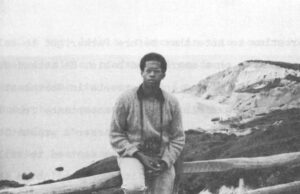 | Barrington Daniels Parker, Jr., on Martha’s Vineyard the summer of 1969. |
Parker clerked from 1969 to 1970 for Aubrey E. Robinson, U.S. District Court Judge in Washington, D.C., and then he took off around the world. “I wanted to do my own grand tour. I know It sounds a bit dated, but that was what I wanted – a tour of places I had read about, and a look at people whose faces I had only seen in geography books.” Parker wandered around Europe and then headed east. “I think my favorite place is Isfahan In Iran. It was the 16thcentury capital of Persia, and there are just fantastic mosques there. Then I have good memories of Kashmir province in India, and of Bali. One always enjoys a place more if the meals are interesting and there is good company every step of the way, Kashmir and Ball had everything that I wanted on that extended vacation. It was a bit like lotus-land before coming home.”
Coming home, of course, meant a job and tentative steps on the New York ladder to success. He joined a prestigious Wall Street law firm and began his climb.
Then on September 15, 1973 he married Toni Trent, the beautiful daughter of the William J. Trents of New Rochelle. Toni had attended Oberlin College (Class of 1970) and the University of California at Berkeley, and had moved to New York as a project coordinator for the Phelps-Stokes Fund. This foundation, which, was set up to improve the operation of black colleges, conduct lectures an African mores and a scholarship program for African students, seemed to be just the place for Toni Trent Parker. For she cones from a long line of black achievers in this country whose contributions are muted and whose strength in a country once teeming with racism is inestimable. She, like her husband, comes from that core of black people to whom James Baldwin in The Fire Next Time wrote the following panegyric:
I have great respect for that unsung army of black men and women who trudged down back lands and entered back doors, saying ‘Yes, Sir’ and ‘No, Ma’am’ in order to acquire a new roof for the school house, new books, a new chemistry lab, more beds for the dormitories, more dormitories. They did not like saying ‘Yes, Sir’ and ‘No, Ma’am,’ but the country was in no hurry to educate Negroes, these black men and women knew that the job had to be done, and they put their pride in their pockets in order to do it.
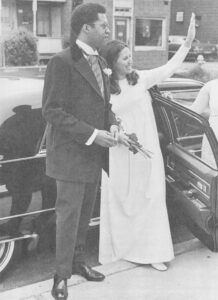 | Barrington Daniels Parker, Jr., and Toni Trent at their wedding on September 15, 1973. |
Toni Parker’s grandfather, William J. Trent, Sr., was the president of Livingstone College in Salisbury, North Carolina, and her father, William Js Trent, Jr., was the executive director of The United Negro College Fund. She is, therefore, the third generation of her family to be involved in black higher education, while her husband is a third generation lawyer.
At their wedding, held at the Rye Town Hilton Inn, in Rye, New York, a visitor casually counted three federal judges, the head of the N.A.A.C.P., the head of the Urban League and three college presidents. This visitor introduced himself to Robert C. Weaver – a cousin of the bride by marriage and the former Secretary of H.U.D. – and wondered about the texture of the assembly. He wanted to know if the people who were toasting this charming couple, and who were, by inference, raising their glasses in celebration of themselves, in any way approached the stereotypical notion of the black bourgeoisie who have been subjected to the most bitter vilification by trendy white and black writers.
Weaver smiled, shook his head and said: “When E. Franklin Frasier wrote The Black Bourgeoisie, he did some of his homework, but not all. You won’t find conspicuous consumption among any of us here, and you won’t find bad manners. You will find an emphasis on education, on achievement and on service. But those things are not fashionable, they don’t make good copy. Still we know who we are, and what we have done. We know that we have done a lot under the most trying circumstances, and that gives us some cause for celebration.”
It goes without saying that Robert Shelton Jones would have approved of his great-grandson, for Parker who will be 30 in August knows, without prodding, that this is his time – he is young, gifted and black and his time has just begun.
Received in New York July 18, 1974
©1974 Orde Coombs
Orde Coombs, a freelance writer, is an Alicia Patterson Foundation award winner. This article may be published with credit to Mr. Coombs and the Alicia Patterson Foundation.

